

The Digital Dividend. Download Files Download the complete 16-page report. 172.38 KB pdf The Mapping Digital Media project examines the global opportunities and risks created by the transition from traditional to digital media.
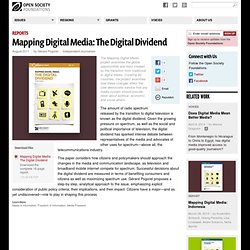
Covering 60 countries, the project examines how these changes affect the core democratic service that any media system should provide: news about political, economic, and social affairs. Mapping digital media: Mexico. Asociación Mexicana del Derecho a la Información. Technical Standards in Terrestrial Television. Download Files Download the complete 21-page report.
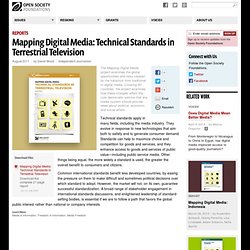
Pwc: Mexico entertainment and media outlook 2012-2016 - ResearchFindr. DTV in Developing Countries. Media Program. Mexico: Case studies for the award of the 700MHz/800MHz band: Mexico. Digital Dividend Toolkit. The GSMA’s Digital Dividend Toolkit offers one-stop access to the latest policies, perspectives and best practices in managing the crucial issue of the Digital Dividend — a unique opportunity to develop mobile broadband services presented by the switchover from analogue to digital television broadcasting.

The toolkit was first produced in 2011 and is regularly updated with new, country-specific case studies. Here you will find impact assessments, technical studies and practical guidance highlighting the approaches of many countries that have allocated Digital Dividend spectrum to mobile broadband. By centralising this information for policymakers, regulators and others concerned with the future of mobile, we hope this toolkit will smooth progress towards mobile broadband for everyone.
GSMA. Digital Dividend in Latin America. ITU: Digital Dividend and Analogue to Digital TV Transition. ITU. ITU: Guidelines for thetransitionfrom analogue to digital broadcasting. ATSC Recommended Practice. Latin America Spectrum Conference. ACMA: Latin American Spectrum Conference. The Latin American Spectrum Conference 24-25 October 2012 — PolicyTracker: the spectrum management newsletter.
Organized in conjunction with the Mexican regulator COFETEL, this is the only conference to focus exclusively on the key spectrum issues in the Latin American region.
It features a programme of high quality training courses and will be held in Spanish and English with a full translation service. Download brochure Versión en español This conference comes at an important time for spectrum policy in Latin America as stakeholders debate digital switchover and how to find spectrum for the next generation of mobile services. Planning for the next World Radio Conference is also a key issue. This is a high-level event featuring not just leading authorities from Latin America, but also from around the world, offering a benchmark for international best practice. Advanced Television Systems Committee. Conference audio: Regulating the Transition. Mexican and Canadian DTV Transition (wtfda) Overview of DTV development worldwide. Mexico to bring analogue switch-off forward? Mexico City impacts of digita tv.
Fifteen years ago, I was helping an IT client to close a sale for Supply chain management software.

He was very optimistic about the Mexican market and told me a phrase I still recall: “Lawyers, Bankers and Government are the last strongholds to conquer.” Yes, he was referring to the difficulty of those ones to embrace technology. At that time, the phrase seemed proper to me. Now, lawyers use iPads for depositions, Bankers have implemented mobile systems for payments and Government moves forward at a different pace. Federal Government has achieved to get rid of red tape through Government 2 Citizen Services (G2C). 1. PRC is an office in charge of receiving, recording and managing the changes on real estate property, incorporations of companies and professional corporations, as well as mergers, split-off, powers of attorney and other corporate records.
City Government has made a tremendous effort to digitalize old records as from 1869 to date. Tijuana to be first in Mexico with digital TV - TalkBaja.com - Baja Mexico Travel, Living and Retirement. President Felipe Calderon announces the change at inauguration of Tijuana Innovadora Written by Sandra Dibble | SDUT 8:06 a.m., Oct. 12, 2012 TIJUANA — This city of more than 1.7 million residents next year will become the first in Mexico to make the switch from analog to digital television, President Felipe Calderón announced Thursday during a visit to Baja California.

Mexico City: a Knowledge Economy. Mexico City Television Stations - Station Index. Digital city. How to survive the digital TV transition. The impending switch to all-digital broadcast TV will be a step forward, but it could be bumpy for many Over the next year or so, you'll be hearing a lot about the digital TV transition.

Here's what you need to know: On Feb. 17, 2009, broadcasters must shut down their analog systems and transmit only digital TV signals to comply with the Digital Television Transition and Public Safety Act. While that sounds cataclysmic, the change will affect only the way free TV will be broadcast over the air, to a rooftop or indoor antenna. All TVs (no matter what type) connected to cable, satellite, or one of the new telephone company fiber-optic services should continue to function (though you might have to get a set-top box for cable; see below).
A TV connected to an antenna might or might not work after Feb. 17, 2009. The Digital TV Transition: What You Need to Know About DTV. Schedule for the implementation of Digital TV. Schedule for the implementation of Digital TV in the world The Digital TV implementation will go through a period of transition, that might last from 10 to 15 years, in which broadcasters will transmit simultaneously two channels of 6 MHz, one analog and other digital.
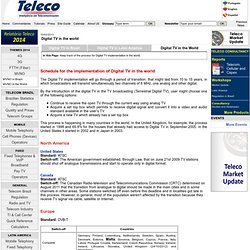
By the introduction of the digital TV in the TV broadcasting (Terrestrial Digital TV), user might choose one of the following options: Continue to receive the open TV through the current way using analog TV Acquire a set top box which permits to receive digital signal and convert it into a video and audio standard available in the user's TV Acquire a new TV which already has a set top box This process is happening in many countries in the world. Mexican radio stations want digital switchover in 2015. Supreme Court: Mexico digitalizes TV for wireless space. México inicia en 2013 ‘apagón analógico’ - Economía. TIJUANA (Notimex) — El presidente Felipe Calderón Hinojosa anunció este jueves que el próximo año Tijuana será la primera ciudad en donde se ponga en práctica el llamado ‘apagón analógico', el cual quedará concretado en todo el país el 31 de diciembre de 2015.
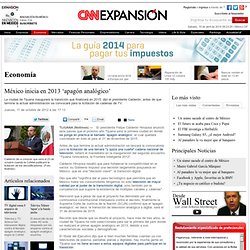
Antes de que termine la actual administración se lanzará la convocatoria para la licitación de una tercera "y quizá una cuarta" cadena nacional de televisión, reiteró el mandatario en la inauguración del segundo encuentro "Tijuana Innovadora, la Frontera Inteligente 2012". Calderón Hinojosa resaltó que para fortalecer la competitividad en el sector, su Gobierno impulsó una decisión largamente pospuesta en México, que es una "decisión clave": la transición digital. Recordó que desde que se diseñó el proyecto, hace más de tres años, la ciudad de Tijuana ha sido seleccionada para ser la primera del país donde se realizará el primer apagón analógico en 2013, debido a sus características sociales y demográficas. Mexico Speeds Up Digital-TV Transition, Will Compete With Grupo Televisa. Mexico will accelerate its transition to digital-television broadcasts, boosting competition against Grupo Televisa SA and freeing up airwaves that can be used for high-speed wireless Internet access.
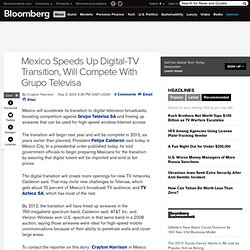
The transition will begin next year and will be complete in 2015, six years earlier than planned, President Felipe Calderon said today in Mexico City. In a presidential order published today, he told government officials to begin preparing Mexicans for the transition by assuring that digital tuners will be imported and sold at fair prices. INFORMATIVE MEMORANDUM REGARDING THE PRESIDENTIAL DECREE UPON WHICH THE MEXICAN FEDERALGOVERNMENT SHALL PURSUE A SERIES OF ACTIO. Mexico moves up digital switchover to 2015 - Entertainment News, International News. Mexico is moving up its terrestrial analog-to-digital switchover date, from 2021 to 2015, after a vote Tuesday in Mexico’s Supreme Court failed to derail the initiative. TV PILOTS/DEVELOPMENT SCORECARD: Follow all of the development action during upfront season President Felipe Calderon first issued the decree to move the date during his annual national address, akin to the U.S.
State of the Union address, on Sept. 2, 2010, but accelerating the switchover meant confronting a wall of political and legal obstacles. The Movie: Mexico moves up digital switchover to 2015. MEXICO CITY -- Mexico is improving its terrestrial analog-to-digital switchover date, from 2021 to 2015, carrying out a election Tuesday in Mexico's Top Court not successful to derail the initiative. Leader Felipe Calderon first launched the decree to move the switchover date throughout his annual national address, like the U.S.
Condition in the Union address, on Sept. 2, 2010, nevertheless the idea met a wall of political and legal obstacles. COFETEL: Mexico watchdog growls at Televisa, TV Azteca - Entertainment News, International News. MEXICO CITY — The head of Mexico’s congressional telco panel spoke out against eight lawsuits issued by Mexico’s dominant broadcasters Televisa and TV Azteca lodged to delay the nation’s digital switchover in 2015 and called on Congress to authorize a $28 million test run in Tijuana in April. Mexico's Federal Telecommunications Commission Approves Program to Auction of Two Nation-wide Digital Terrestrial Television (TDT) Networks. COFETEL will invest in grants for Mexico’s analogue switch over. Mexico’s DTT public consultation. By Chris Forrester Mexico’s media regulator is to invite public discussion on how the next two free-to-air digital TV channels will be determined.
The idea is to gauge public demand for the channels, and whether they should be national or regional, and what interest there might be from organisations and broadcasters wishing to run the channels. The bidding process is expected to open before the end of next year. One other option will be for Mexico to levy a fee from the winning broadcaster. Mexico will subsidise DTT. By Chris Forrester Mexico’s Federal Telecommunications Commission has decided to modify its Digital TV broadcasting transition policy first established in 2004, and is now backing a gradual analogue blackout programme, which is expected to be completed in 2016. Mexico licenses 146 DTT channels. By Chris Forrester. Mexico starts bidding for digital channels: Move threatens Televisa-TV Azteca duopoly. June 12, 2012|James Young | Variety MEXICO CITY -- Mexico's telco regulator Cofetel opened bidding for two new nationwide, free-to-air digital TV channels Tuesday -- a move that will create a fundamental shift in the market long dominated by TV giant Televisa and its smaller rival, TV Azteca.
Applicants have 30 days to submit offers, after which the regulator has 30 days to make a decision, meaning that Mexico will announce the two new networks mid-August. While it is theoretically possible for Televisa and TV Azteca to bid, a Cofetel board member, speaking to the local media, hinted that it is likely to deny them the opportunity. Mexico starts bidding for digital channels - Entertainment News, TV News. MEXICO CITY — Mexico’s telco regulator Cofetel opened bidding for two new nationwide, free-to-air digital TV channels Tuesday — a move that will create a fundamental shift in the market long dominated by TV giant Televisa and its smaller rival, TV Azteca. TV PILOTS/DEVELOPMENT SCORECARD: Follow all of the development action during upfront season Applicants have 30 days to submit offers, after which the regulator has 30 days to make a decision, meaning that Mexico will announce the two new networks mid-August.
Mexico's Federal Telecommunications Commission approves program to auction of 2 nation-wide digital terrestrial television (TDT) networks. Recent developments. Private Actors: Televisa and Harris Corporation. See more news releases in Computer Electronics | Computer Hardware | Computer Software | Radio | Television.
Grupo Televisa moves forward with DTV transition. Originally featured on BroadcastEngineering.com. Mexico halts analogue TV switch off. Slim's Internet TV plans a costly mistake: Salinas. By Patrick Rucker WASHINGTON Tue Oct 2, 2012 5:23am IST WASHINGTON (Reuters) - Carlos Slim's plans to broadcast Mexican soccer via his Internet television service is a costly gamble that should be halted by regulators, Mexican billionaire Ricardo Salinas said on Monday. Slim, the world's richest man, bought a controlling stake in two leading Mexican soccer teams last month and the billionaire intends to broadcast the teams' games through third-party cable contracts and his online web 'channel' Uno TV.
Salinas, head of Mexican broadcaster TV Azteca, said Slim overpaid for a foothold in the market and local sports fans could revolt if they cannot easily watch the sports teams they love because they are on pay cable or on the Internet. Grupo Televisa selects Harris DTV transmitters. Originally featured on BroadcastEngineering.com.